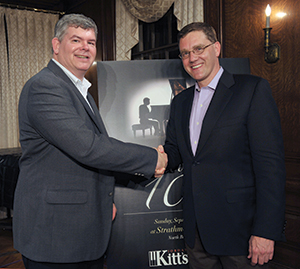OCT. 11 I JORDAN KITT'S I ANNIVERSARY
Jordan Kitt's Celebrates Centennial
 On Sept. 16, Jordan Kitt’s Music co-owners Chris Syllaba and Ray Fugere welcomed more than 100 employees, vendors and guests to the Strathmore, a mansion in Rockville, Md. During the gala, Syllaba explained that all four Jordan Kitt’s stores, year to date, had posted “significant” sales increases. On Sept. 16, Jordan Kitt’s Music co-owners Chris Syllaba and Ray Fugere welcomed more than 100 employees, vendors and guests to the Strathmore, a mansion in Rockville, Md. During the gala, Syllaba explained that all four Jordan Kitt’s stores, year to date, had posted “significant” sales increases.
Two years ago, he would’ve been telling a different story.
Syllaba and Fugere, both longtime employees of the Rockville-based piano dealership, took over Kitt’s in June 2011 after the company fell under hard times. In the first six months of that year alone, Kitt’s had shrunk from 11 to four stores. Now, under new owners, business has “improved greatly,” according to Syllaba.
“The week of Labor Day alone we sold 91 pianos company-wide — and 23 the week after Labor Day,” said the Jordan Kitt’s president.
It’s not the first time new leadership has brought Kitt’s back from the brink. Former owner Bill McCormick took over the company in 1971 as it was on the verge of folding. (By the mid-’90s, he’d built it into the largest U.S. piano retail chain.) Previous leaders also had to steer the company through the Great Depression and World War II, when many manufacturers stopped producing pianos altogether. (“All of a sudden, you had dealers who couldn’t buy inventory,” Syllaba said.)
And he and Fugere have had their own challenges since the buyout. Namely, they’ve faced a sluggish piano-market recovery and the task of refreshing an ailing organization. Being Kitt’s insiders, according to Syllaba, has helped them tackle these issues.
“Ray and I had a pretty good idea of what parts of the culture needed to change and what parts needed to stay,” he said. “And we have many employees in the company who have been with it 10, 20, 30 years and are very capable.”
Revitalizing Kitt’s
Boosting morale turned out to be key to refreshing the company.
Syllaba mentioned that the buyout itself helped reinstill employees’ confidence in Kitt’s. “They were so excited that the acquisition was successful,” he said. “People have such terrific loyalty to Jordan Kitt’s. They were ecstatic that it wasn’t going down the tubes.”
After the acquisition, the new owners charged employees to take more initiative with tasks that were previously handled by “the old bureaucracy.” Ironically, Syllaba said everyone was happy to do it.
“Everyone was willing to pitch in a little bit more and on things that, in the past, were done by corporate. Now, a lot of those things are being done at the store level. That can be motivational, too, because you’re kind of empowering the salespeople to do things they’d never done before.”
The piano market has also been coming back, albeit slowly. As Syllaba noted, “Everyone has gone downstream,” too. A recent upsurge in used pianos at the Washington, D.C., stores is the most obvious example of this shift. Syllaba estimated that used pianos now make up 15 percent of unit sales at Kitt’s two D.C.-area stores, a big change from previous years. These days, the D.C. stores get two to three calls daily from residents trying to sell their instruments.
“My guess, off the top of my head, is that our used piano sales, especially in Washington, are at least 50-, maybe even 100-percent higher than in our history,” Syllaba said.
“In the Atlanta market, we don’t have as many used pianos. But each of our stores in Washington has at least 15–20 used pianos at any given time — maybe even 25. Then there are always five or 10 in the warehouse that are in the process of being prepped.”
Atlanta Facelift
The new owners tackled one additional challenge after taking over Kitt’s: an Atlanta location that looked like “a dollar store in really bad condition,” Syllaba said with a laugh. The store’s outdated look was especially problematic since it traded in more new pianos than the D.C. store.
In September 2011, Kitt’s completed a two-month-long remodeling of the dealership. The project included new carpeting, laminate flooring, updated lighting and a look that resembled the more stylish Alpharetta, Ga., location. The outside also got repainted dark red.
“It didn’t cost that much to do it,” Syllaba said. “We worked with a local contractor who one of our employees knew. It was just him and his family.”
Since the facelift, Syllaba pointed out that the Atlanta store’s sales have increased by more than 30 percent, year to date. The challenge going forward is keeping sales rising in a tough piano market.
“The only frustrating thing is that it’s not soaring,” he said of the piano business. “It’s still a little bit up and down. But the up is going generally in the up direction instead of the down direction.”
| 


